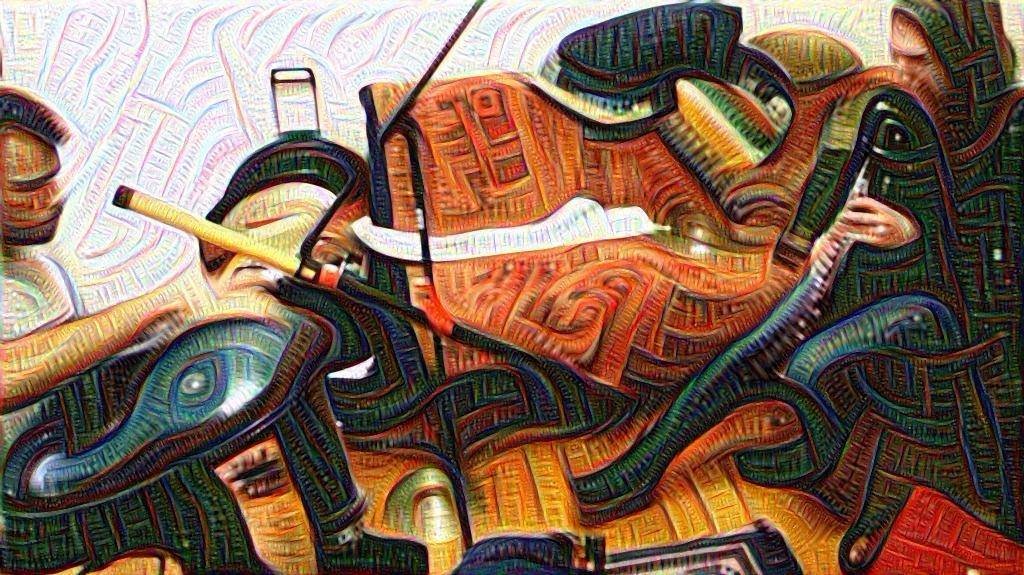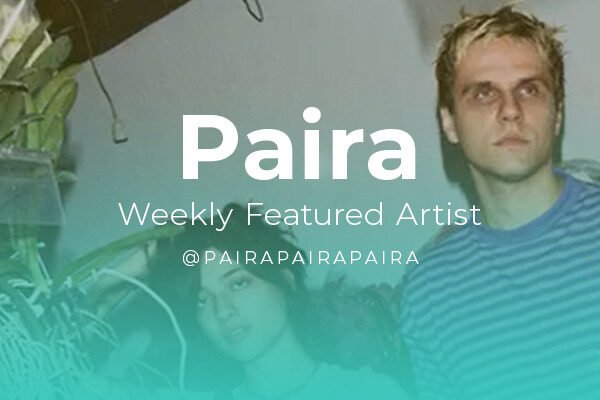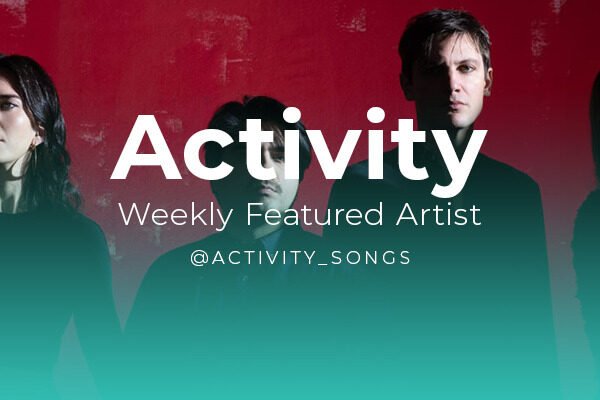There are few things more sacred to a lover of music than those discoveries that seem to come out of nowhere, those little shiny pearls of brilliance that could so easily have been lost in the tides of time were it not for sheer luck or dedicated digging. My interaction with Zeitgeber started with one such fateful encounter. In early 2017, while roaming the vast plains of Bandcamp, I was struck by the beautiful cover of their EP Heteronomy and decided to give them a listen. Needless to say, I was immediately awe-struck by what I heard; their combination of psychedelic rock, electronica, and world music proved to be even more infectious and tasteful than the cover art suggested. And the rest is history, as they say.
To think that I might as well have scrolled past the record and missed out on what turned out to be one of the best records of 2017! It would’ve been so easy to not give them a fair chance, which is why I’m all the more elated to announce Zeitgeber as our latest Weekly Featured Artist.
The Origins of Time
I referred to Zeitgeber as ‘them’ up to this point, which is technically incorrect. While there are some recurring guest musicians, the main mastermind behind the project is and always has been Evan McGregor. It was him who launched it, and it is him who writes/composes all the music related to it. The first steps towards Zeitgeber took place when he lived in England between 2009 and 2013. There, he played in different bands, but was ultimately left searching for a way to express his quieter, more acoustic-based ideas. This is where the handpan comes in as his unique instruments of choice, but we’ll get to that later.
At first, the only intention behind his new compositions was experimentation (and maybe ‘try out some busking’), but when he returned to Australia in 2014, McGregor ‘slowly began putting together a whole lot of songs and playing with other musicians, with the intention of creating the first album’. Which ended up being the Heteronomy we all know and (hopefully) love today.
EIN: Your music obviously covers a lot of ground. What are some of your earliest and most recent (non-)musical influences?
EM: Some of my earliest influences were when I was 12-14 years old listening to grunge and rock like Nirvana, Soundgarden, Pearl Jam. That paved way to discover more experimental, progressive and heavier music later on like Faith No More/Mr. Bungle, Pantera, Tool, Devin Townsend, etc. Then I got into more technical stuff like Meshuggah, Dillinger Escape Plan etc. Throughout all of this, my drumming was also simultaneously inspired by a lot of groove based music like funk/reggae/electronic beats, etc.
While I still love some of the heavier stuff today, I’m probably mellowing out a little, listening to a broader range of music. But I generally like music that is doing something different or has an experimental edge. Here’s just a fairly random example of some bands I’ve really dug in the last few years: Tigran Hamasyan, Schnellertollermeier, Oumou Sangare, Tune-Yards, Twelve Tone Diamonds, Jaga Jazzist, Mountain Man, Amjad Ali Khan, Tatran, Utopianisti, Dawn of Midi/SSAHHA, The Necks.
EIN: Did you always plan to include world music influences in a project of yours or did that come naturally with Zeitgeber?
EM: The sound of Zeitgeber was not a premeditated thing. I generally try not to plan what I’m going to do in any musical project. I think that generally gets in the way of creativity and allowing the music to develop naturally. I think the world music influences in Zeitgeber happened largely because of the particular instrumentation that is used. The handpan has a particular ‘world’ sound because of the particular voicing of the notes, and because of its similar sound to the Caribbean steel drum. Then there is the thumb piano, clarinet and African percussion all adding some exotic flavour. I guess I have been listening to a lot more music from all around the world in the last 5-10 years, and I’m particularly interested in Balkan and African rhythms, so some of that stuff naturally came out in my playing and writing too. In addition, Phillippa studied music at the Sydney Conservatorium of Music so she has a strong jazz/ classical background as well as diverse influences, so that all added a worldly flavour to the record too.
The name McGregor chose for his newly devised project stems, interestingly enough, from the realm of chronobiology, in which the word ‘zeitgeber’ refers to the various external factors influencing the so-called circadian rhythms of living organisms. These include sounds, social interactions, temperature, and most importantly, light: ‘This particular zeitgeber keeps our internal clocks running properly. Interestingly, without light, our biological rhythms run approximately in a 24-hour cycle, but not exactly; so light is the signal which fine tunes the cycle and keeps it on track’, elaborates McGregor on this specific subject. ‘I think we tend to overlook this in our modern western world – most people think of themselves as totally free agents, when in fact the environment and other organisms are constantly sending us sensory information which modulates our behaviour, often on an unconscious level’.
‘Therefore, it is possible to view the world as one larger machine/organism with many functioning parts, rather than being made up of isolated, unrelated components. In a way, this is a scientific view of concepts prominent in Eastern philosophies such as oneness and the interconnectedness of all things’, he continues. So on a philosophical level, he chose his current moniker Zeitgeber as a ‘call for humility to the hidden forces and processes behind living things and the natural world’, but there is also a much more profane reasoning behind it, namely its direct connection to the concept of rhythm: ‘I like that rhythm is a prominent concept related to zeitgebers and chronobiology. Since the project has a very strong rhythmic component, the name choice and multiple meanings seemed apt’.
The Unique Instrumentation at Hand
As mentioned above, one of the main characteristics of Zeitgeber’s music is the prominent use of the handpan, which stems from the same family of musical instruments as the hang drum (most notably utilized by UK jazz group Portico Quartet these days). McGregor owns a handpan of the ‘Caisa’ variety, manufactured in Germany and tuned to the key of D. While he was still living in England, he saw somebody playing it, and immediately fell in love with the instrument’s sound – subsequently enrapturing his own listeners with its ethereal sonic qualities a few years down the road. ‘It seemed perfect for me as a drummer who wanted to expand – it was a percussive instrument that was tuned to a single key, so didn’t require a massive learning curve’, he said about his initial decision to pick up the handpan.
EIN: You had a few collaborators playing with you on Heteronomy. Is that the approach you took for the new material as well, or is it just you doing everything this time around?
EM: I had started out writing this one with the intention of doing all the playing this time. That was only because Phillippa (clarinet/viola) was living overseas. But after getting close to finishing writing these songs, it became obvious that I needed her outstanding playing on the record. So luckily for me, she is back in the country now and we are recording her parts soon.
The producer for Heteronomy is a good friend, Niko O’Brian, who lives in the UK. Because we are currently in different countries, I did also consider using someone else, but again I just couldn’t think of anyone better for the job. Some of the tracking for this EP has been done by other people, but Niko will be mixing the EP, which is great news. His production style is perfect for Zeitgeber.
EIN: Where did the idea of creating a cinematic companion piece to Heteronomy come from?
EM: There is so much heavy conceptual material related to Zeitgeber. So, being an instrumental album with some dialogue samples, there was also so much room for conceptual visuals to go with it. Some time after the album was released I came across some old video archives of weird science/anatomy documentaries. I immediately thought it would be great to make a video clip or two. Then when I started sifting through more and more of this archive footage, I was astonished how much of it could be directly linked to many of the perception/chronobiology concepts that Zeitgeber is about. Since I had access to tons of footage, I set myself the challenge of putting together a clip for the entire album. It took along time but it was a lot of fun. I think I’m done with video editing for a while after that though!
The Future and What it Might Hold
Currently, McGregor is hard at work crafting a new EP. It’s already recorded for the most part; only some additional instruments still need to be tracked. Afterwards, he’ll send it over to the UK to have it mixed and mastered, hopefully to be released by February 2019. As for the musical direction he took with the new Zeitgeber material, ‘it’s basically a more dense, intense and deeper exploration of the kind of thing that occurred on Heteronomy’. He continues to say that ‘I went all out and just let the creative process unfold without limitation. As a result, it ended up being two songs of over 10 minutes each, and you could say that overall it’s more progressive’.
Aside from adding an electric bass to his repertoire, and exploring new ways to integrate the tonally limited handpan into his increasingly complex compositions, he focused heavily on the polymetric framework of his music for the as of yet untitled EP: ‘Each 10 min+ is based around multiple explorations of a single odd time ostinato. At the same time there is basically always a polymeter occurring (another time signature simultaneously occurring and overlapping). It gets pretty complex in some parts; for example there is a section with 3 simultaneous meters – 4/4, 5/16, 7/16’. He’s quick to reassure those who might worry about his work becoming too heady, saying that ‘this all might sound unnecessarily mathematical and cerebral, but I was mindful to let melodies and larger patterns emerge out of this in the writing process, ones that in the end felt very intuitive and musical rather than mechanical’.
Looking into the future, there looms a certain uncertainty over the Zeitgeber project. Indeed, this next EP might be the last we hear from this outlet of McGregor’s: ‘I really went all out on this EP and currently don’t see where else I could go. There’s currently nothing else I feel I need to say with this project and I definitely don’t want to create works that are very similar to each other’. He did admit, however, that acquiring another handpan or taking the project into a more piano-driven direction might sway this decision. For now, though, there’s no way to tell if he’ll simply start a new project, or shift the musical direction of his current one; whatever the future may have in store for him and his music, I’m certain McGregor will continue to push out forward-thinking and exciting material.
In Conclusion
I strongly encourage you to familiarize yourselves with Zeitgeber‘s music if you have yet to check them out. Heteronomy didn’t nab a spot on out ‘Best Records Of 2017’ list for nothing, so I hope you continue to trust our judgement and give this unique little project your unmitigated attention. In addition to this, be sure to follow them on Facebook to keep up to date with news on the upcoming EP, which will most likely be out next year via our friends in Art As Catharsis.






